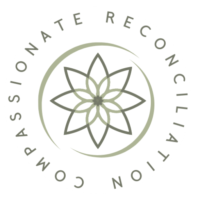July 23, 2021
Dear Kundalini Yoga and Sikh Dharma Communities,
We are happy to provide this biweekly communication on the work of the Compassionate Reconciliation Project.
Updates
We are continuing to meet with and support Advisory Teams in the CRC representative selection process (to learn more about this process, please see our previous updates), providing facilitator trainings to Advisory Team members, engage the SSSC board in their discernment process, among other activities associated with maintaining momentum and progress in the Compassionate Reconciliation Process.
Upcoming Events
July 30: European 3HO Yoga Festival: Just Outcomes will be facilitating a session at the European Yoga Festival with the goal of creating a safe, structured, and inclusive space for sharing and dialogue to take place through the technology of Circles.
Navigating Complex Community Harm and Conflict
This week, we want to introduce you to some thinking that has been very influential for us, with the hope that it may resonate, inspire, or catalyze fresh thoughts for some of you as well. One of our mentors in the work of Restorative Justice and Peacebuilding is John Paul Lederach. In his book “The Moral Imagination” he states that “the goal of transcending [grievous conflict, harm and] violence is advanced by the capacity to generate, mobilize, and build the moral imagination.” Through his work, peacebuilders and conflict strategists around the world have come to embrace community crisis and harm as an exploration of uncertain terrain that is full of opportunity and the need to be creative and responsive.
The capacity of “the moral imagination” to effectively deal with complex community crisis and conflict is dependent on the following 4 faculties:
- The capacity to imagine ourselves in a web of relationships, one that includes even our “enemies”.
- The ability to embrace complexity without getting caught up in social schism.
- A commitment to the creative act.
- An acceptance of the risk that necessarily goes along with attempts to transcend grievous conflict, harm, and violence.
Lederach goes on to further explain these capacities as follows:
- The Centrality of Relationships: Relationships form the context in which harmful acts happen and also generates the energy that enables people to transcend harm and trauma. As people acknowledge their relational interdependency and recognize themselves as part of the pattern, they may be able to envision a wider set of relationships and take personal responsibility for their own choices and behavior. In short, peacebuilding requires that people envision their interconnectedness and mutuality.
- The Practice of Paradoxical Curiosity: Cycles of harm are often driven by polarities. Choices about responding to conflict are forced into either-or categories: you are either with us or against us. Moral imagination involves the capacity to rise above these divisions and reach beyond accepted meanings. Paradoxical curiosity is a matter of respecting complexity, seeking something beyond what is visible, and discovering what it is that holds apparently opposed social energies together. It involves accepting people at face value, and yet looking beyond appearances and suspending judgment in order to discover untold new angles, opportunities, and unexpected potentialities.
- Provide Space for the Creative Act: Moral imagination arises through creative human action that arises out of the everyday and yet moves beyond what exists to something new and unexpected. Because new ways of thinking may pose a threat to the status quo, it is important to provide space for the creative act to emerge. This requires a commitment to creativity and a belief that it is possible to move beyond the parameters of what is commonly accepted. This quality of providing for and expecting the unexpected is well-known in the world of artists and needs to be cultivated in the world of peacebuilders. Creativity opens us to avenues of inquiry and provides us with new ways to think about social change.
- The Willingness to Risk: To take a risk is to step into the unknown without any guarantee of success or safety. For many people caught in conflict, violence [and harm] is what is known, while peace remains a mystery. Because peacebuilding typically requires people to move toward a new, mysterious, and unexpected future, it is a difficult journey.
You can learn more about John Paul Lederach at the following websites:
- https://www.beyondintractability.org/bksum/lederach-imagination
- https://kroc.nd.edu/faculty-and-staff/john-paul-lederach/
We invite you into the reflection, exploration, and conversation about how “moral imagination” helps shape the Compassionate Reconciliation Project in your communities.
Yours in kindness, compassion, and gratitude,
Catherine Bargen, Matthew Hartman, Cara Walsh, Aaron Lyons, and our extended Just Outcomes Team
Sign up here to receive regular updates from Just Outcomes about the Compassionate Reconciliation Project. By signing up you will receive updates about Compassionate Reconciliation only.
